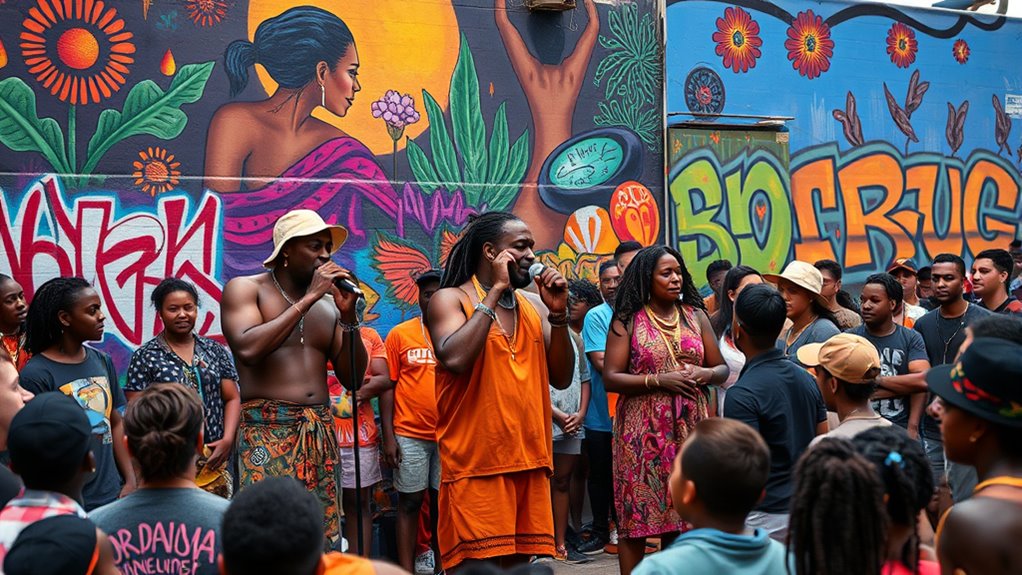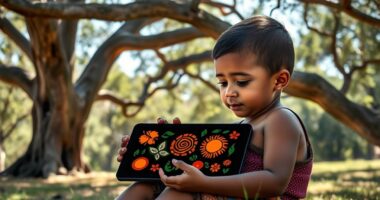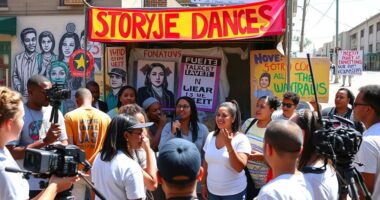Indigenous hip-hop is transforming Australia’s cultural scene by blending traditional sounds with modern beats, giving voice to stories, struggles, and pride. It serves as a powerful tool for social activism, challenging stereotypes and advocating for land rights and justice. This movement strengthens community bonds and celebrates Indigenous heritage while inspiring pride and resilience. If you explore further, you’ll discover how these artists continue to shape Australia’s dialogue on history, identity, and reconciliation.
Key Takeaways
- Indigenous hip-hop blends traditional sounds with modern beats to express cultural identity and heritage.
- Artists use music to challenge stereotypes, advocate for justice, land rights, and Indigenous sovereignty.
- Hip-hop fosters community resilience, providing a voice for marginalized youth and cultural pride.
- The movement promotes inclusion, storytelling, and acts as a platform for social activism and societal change.
- Indigenous artists influence broader conversations on history, rights, and reconciliation in Australia.

Have you ever wondered how Indigenous artists are shaping the Australian hip-hop scene? It’s more than just music; it’s a powerful platform for expressing cultural identity and driving social activism. These artists use their lyrics and performances to tell stories that often go unheard, shedding light on histories, struggles, and aspirations unique to their communities. By blending traditional Indigenous sounds with contemporary beats, they create a distinctive style that celebrates their heritage while resonating with wider audiences. This fusion isn’t just artistic; it’s a statement that Indigenous culture is vibrant, relevant, and integral to Australia’s identity.
Through their music, Indigenous hip-hop artists challenge stereotypes and confront societal issues head-on. They use their voices to advocate for justice, land rights, and the recognition of Indigenous sovereignty. This form of social activism isn’t confined to lyrics; it’s embedded in their very presence and message. When an artist raps about colonization, dispossession, or ongoing discrimination, they’re forcing listeners to confront uncomfortable truths. Their performances often serve as gatherings for community empowerment, reinforcing a shared cultural identity that refuses to be erased or marginalized. By doing so, they inspire others to stand up, speak out, and take pride in their roots.
Indigenous hip-hop challenges stereotypes and promotes justice through powerful performances and messages of cultural pride.
Indigenous hip-hop isn’t just about individual expression; it’s a movement that fosters connection and resilience. It provides a voice for young people who might otherwise feel silenced or disconnected from mainstream society. These artists draw from their cultural heritage—using language, symbols, and stories—to create a sense of belonging and pride. Their music becomes a rallying cry for social change, reminding audiences that Indigenous voices are essential to Australia’s future. By integrating their cultural identity into their art, they resist cultural erasure and ensure that their stories are heard loud and clear. Additionally, the rise of Indigenous hip-hop aligns with broader efforts to promote AI Security, ensuring that their cultural expressions are protected and respected in the digital age.
The rise of Indigenous hip-hop signifies a shift in the Australian music landscape—a shift towards more inclusive, honest storytelling. These artists aren’t just entertainers; they’re cultural ambassadors, social activists, and community leaders. Every song is a declaration of strength and resilience, a reminder that Indigenous culture continues to thrive and adapt in a modern world. Their influence extends beyond the stage, impacting conversations about history, rights, and reconciliation. As you listen, you’ll see that Indigenous hip-hop is more than music—it’s a movement that embodies cultural pride and a call for social justice.
Frequently Asked Questions
How Has Indigenous Hip-Hop Influenced Youth Culture in Remote Communities?
You see that Indigenous hip-hop has become a powerful tool in remote communities, shaping youth culture through urban expression. It helps you connect with your cultural identity while sharing your stories and struggles. This music encourages you to take pride in your heritage, fostering a sense of belonging and resilience. By blending traditional and contemporary sounds, it transforms how you express yourselves, inspiring confidence and unity among young people in these communities.
What Role Does Indigenous Language Play in Contemporary Hip-Hop Songs?
You see, indigenous language plays a crucial role in contemporary hip-hop songs by promoting language preservation and strengthening cultural identity. When artists incorporate native words and phrases, they keep their traditions alive and share their stories with a wider audience. This use of language not only celebrates their heritage but also empowers youth to reconnect with their roots, fostering pride and resilience in their communities through powerful musical expression.
How Are Indigenous Artists Collaborating Internationally Through Hip-Hop?
You see indigenous artists collaborating internationally through hip-hop by engaging in global collaborations that foster cultural exchange. They work with artists from different countries, blending traditional elements with modern beats, which helps share their stories worldwide. These partnerships break down geographical barriers, promote understanding, and create a vibrant exchange of ideas. As a result, indigenous voices gain broader audiences, strengthening their cultural presence and inspiring others through the power of global collaborations.
What Challenges Do Indigenous Hip-Hop Artists Face Within the Mainstream Music Industry?
Did you know Indigenous artists often face industry barriers, with only 5% of mainstream music featuring Indigenous voices? You might struggle with maintaining cultural identity while gaining recognition, as mainstream platforms sometimes overlook or marginalize Indigenous stories. These challenges make it harder for you to break into the industry, risking your cultural message being diluted or misunderstood. Overcoming these barriers requires resilience and a strong commitment to your roots.
How Is Indigenous Hip-Hop Contributing to Reconciliation Efforts in Australia?
You see that Indigenous hip-hop fosters reconciliation by strengthening cultural identity and promoting political activism. As you listen, you realize it helps raise awareness of historical injustices, encouraging dialogue and understanding. By sharing stories and perspectives, Indigenous artists challenge stereotypes, inspire respect, and build bridges between communities. This powerful form of expression actively contributes to healing wounds, fostering unity, and supporting Australia’s ongoing journey toward reconciliation.
Conclusion
You see, Indigenous hip-hop isn’t just music; it’s a powerful voice that shakes things up and challenges the status quo. By embracing this movement, you’re witnessing a culture that’s breaking barriers and sharing stories that need to be heard. Remember, it’s not just about words or beats — it’s about making a mark and standing tall. So, don’t sit on the fence — get involved and be part of this inspiring journey.









